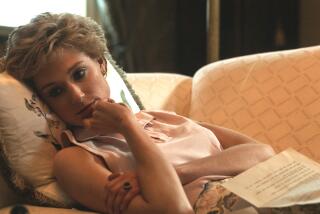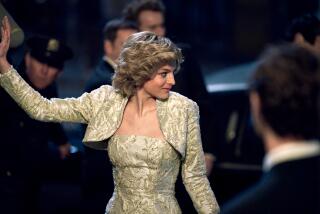Whither the Dignity of Today’s Royalty? : Books: British scholar Rosalind Miles cringes at the public whining of Charles and Diana. Both, she says, would have been better off following Elizabeth I’s dignified example.
- Share via
NEW YORK — If Elizabeth I had been faced with the likes of the wayward Princess Diana, she’d have thrown the witless woman into the Tower of London and launched a smear campaign.
So asserts British literary scholar Rosalind Miles, Oxford-educated author of 15 nonfiction and fiction works--including two bestsellers in England.
But it’s not Diana’s alleged adultery that would have irked the so-called Virgin Queen.
It’s that Diana broke the aristocracy’s centuries-old code of honor by leaving her husband and publicly whining--moves to rock the royal barge that she learned from her mother.
“She’s bleated, whined and leaked like a sieve,” says Miles, relaxing with coffee in her Times Square hotel room at the end of a three-week U.S. book tour, soon to return to her 16th-Century farmhouse in Warwickshire. “In Elizabeth’s day, she would’ve been silenced and saved from these embarrassing affairs . . . with chinless wonders.”
Miles, 43, is accustomed to speaking for the 16th-Century monarch. Her latest tome--a 595-page novel called “I, Elizabeth” (Doubleday, 1994)--is written entirely in the first person and took five years to write.
“Elizabeth I’s own voice was so distinctive, in the end I could almost hear her talking to me,” Miles says.
She says she wrote the book because she respects the woman who juggled a problem-plagued childhood, religious tempests, breathless bedchamber secrets, the Spanish Armada and her nemesis Mary, Queen of Scots, all without losing her royal image.
“What an amazing woman,” Miles says.
She can’t say the same for Diana, whom she calls “unbelievably narcissistically involved.”
And she’s not too keen on Prince Charles, either, for having followed Diana’s example of “girlie blabbering.”
Again she harks to the glory days of Elizabeth I.
“She would’ve sent Charles off to conquer new worlds--heroic action is always good. Give him a whiff of grapeshot and he would’ve had plenty to do. Today, he’s just a man without a function.”
So what’s a modern-day Royal Mom to do?
“The Queen couldn’t have done anything more,” Miles says. “She has put up and shut up all her life. She’s staggered by this betrayal of privacy.”
Adds Miles: “I follow this with great concern. It’s not a soap opera, it’s a Greek tragedy.”
*
As Miles details in her book, randy royalty is nothing new. In fact, she says, Elizabeth I was a sexy and passionate woman who likely had several romantic liaisons with members of her court, remaining single only to retain independence and power.
“People were not faithful in the Old World. . . . It was a virile, full-blooded age,” she says, adding that there is still today much more random and adulterous sex in England than ever in America.
But the difference between then and now and here and there is the way infidelities are handled by spouses.
Explains Miles of those centuries-old English ways: “Edwardian girls were brought up to believe lovers were flowers and husbands trees. Divorce was not acceptable.”
Likewise, for men, “There’s a solidly established tradition of having a wife and mistress. You treat your wife decently, don’t bring your mistress to the dinner table and turn a blind eye to your wife’s boyfriends.”
Adds Miles: “It’s a stark code but it’s clear. You live by it and die by it.”
So what went wrong with Charles and Di? The answer is simple, says Miles: Their calculated merger was a royal matchmaking mistake right from the start.
“The (royal family) wanted a wife for Charles who was blue-blooded, a virgin, and she had to be tall,” Miles says. “The physical pedigree dominated their minds.”
But had they taken Diana’s “psychological pedigree” into account, the royals would have thought twice, she says.
“This was the child of the worst divorce that’s rocked British aristocracy since the 18th Century,” Miles says, detailing the history of Diana’s mother, who left her husband for her lover. “Her mother broke the code of carrying on the affair and remaining in the marriage. She ran away with the bloke.”
As a result, Diana grew up with a series of “horrible nannies” and a “hysterical obsession to build a family life--to make things right this time,” Miles says. That’s why she wouldn’t “put up and shut up” about Charles’ infidelity.
Says Miles, who calls herself a feminist: “Charles was brought up by the code and taught that adultery is OK. But Diana wasn’t, so she blew (the code) out of the water. She’s a selfish and hysterical mother who puts her own unhappiness above her children. If she loved her children, she would’ve stayed with their father.”
But doesn’t she sympathize with Diana’s plight?
“Well, she was used, but she’s deeply ignorant,” Miles says. “The cruel truth is she was redundant the minute she produced the heir and the spare.”
She sniffs.
“Damaged people are damaging,” she says. “She’s dragged British aristocracy into the era of tabloid confessionals, which are low class. That’s why people there hate her to death.”
Still, when pressed, she does express a bit of hedged pity for the princess.
“I do feel terribly sorry for her, but she 100% contributed to everything,” Miles says. “She’s a player in this Greek tragedy. Given an option at every stage, she’s picked the stupid one.”
*
Miles’ impatience with Diana perhaps stems from the plucky way the author has handled her own life’s travails.
At the age of 10, after getting a scholarship, Miles was plucked from her “very ordinary family--poor as church mice” (her father was a baker) who lived in a wild-flowered rural paradise. She was sent to a “hothouse girls’ school with daughters of bishops and things.”
“One day I’m climbing trees in the countryside and the next day I’m learning Greek in a repressed girls’ school atmosphere,” she recalls. “I was to be bitterly unhappy for the next 7 1/2 years.”
Still, she was a good student, and “cottoned onto the fact that if I hung in, I’d get to Oxford. It came to me that this was the price, so you bite the bullet and you get there.”
During this time, her father, who suffered throughout her childhood with what was diagnosed as tuberculosis but really was cancer, had a lung removed and was in a convalescent home for two years. Her mother developed cancer and died when Miles was 15.
But Miles didn’t break down, she says.
“I learned to be British, to put up and shut up. You don’t talk about your feelings--no bleating, no whining. You’re magnanimous in victory, dignified in defeat.”
She went on to study English at Oxford, where she won prizes; earned master’s and doctoral degrees at Birmingham’s Shakespeare Institute, and then another master’s at the Centre for Mass Communication Research at the University of Leicester. She also married and had two children.
Her marriage is happy, she says, but even if it weren’t, she’d never leave her husband.
“As soon as I had children, divorce was off the agenda,” she says.
She describes her studies as her “secular religion.”
“I’ve always found my comfort in it,” she says. “Every crisis we face, someone has been there before us and written about it beautifully. That’s our solace.”
She notes that in America, the religion is “spilling your own guts” in everything from 12-step meetings to talk shows. Asks Miles: “Why not see if someone’s done it before and done it better?”
But despite her disdain, she admits to fascination.
“I’m glued to the TV here where grown-up people are spilling everything,” she says, segueing into the subject of a talk show she saw here on her tour. The subject: sexual incompatibility.
“Here this dorky-looking guy is saying his wife’s sex demands are insatiable,” she says. “And in bounces this woman--his wife--just oozing sexuality. The defeated-looking nerd was all over her like cheap after-shave.”
She laughs. “I couldn’t tear myself away even though I had important appointments to get to,” she says.
So, will British aristocracy go the way of Diana and undignified, spill-your-guts America?
Absolutely not, Miles says.
“This is seen as a big dramatic thing but it’s not, really. People underestimate the phlegmatic nature of Britain.
“There’s a bit of logistical juggling, of twiddling knobs to adjust the reception, but things go on and things don’t change.”
More to Read
Sign up for our Book Club newsletter
Get the latest news, events and more from the Los Angeles Times Book Club, and help us get L.A. reading and talking.
You may occasionally receive promotional content from the Los Angeles Times.










